- Home
- Deborah Harkness
Shadow of Night: A Novel Page 27
Shadow of Night: A Novel Read online
Page 27
“That’s not why I’m trembling.” Matthew stood, blocking out the light from the candles.
My heart caught at the sight of him. He smiled, hearing the slight irregularity, and drew me toward the bed. We shed our clothes, tossing them to the floor, where they lay in two white pools that caught the silvery light from the windows.
Matthew’s touches were feather-light while he tracked the minute changes already taking place in my body. He lingered over each centimeter of tender flesh, but his cool attention increased the ache rather than soothing it. Every kiss was as knotted and complex as our feelings about sharing a child. At the same time, the words he whispered in the darkness encouraged me to focus solely on him. When I could bear waiting no longer, Matthew seated himself within me, his movements unhurried and gentle, like his kiss.
I arched my back in an effort to increase the contact between us, and Matthew stilled. With my spine bowed, he was poised at the entrance to my womb. And in that brief, forever moment, father, mother, and child were as close as any three creatures could be.
“My whole heart, my whole life,” he promised, moving within me.
I cried out, and Matthew held me close until the trembling stopped. He then kissed his way down the length of my body, starting with my witch’s third eye and continuing on to my lips, throat, breastbone, solar plexus, navel, and, at last, my abdomen.
He stared down at me, shook his head, and gave me a boyish grin. “We made a child,” he said, dumbfounded.
“We did,” I agreed with an answering smile.
Matthew slid his shoulders between my thighs, pushing them wide. With one arm wrapped around my knee, and the other twined around the opposite hip so his hand could rest on the pulse there, he lowered his head onto my belly as though it were a pillow and let out a contented sigh. Utterly quiet, he listened for the soft whooshing of the blood that now sustained our child. When he heard it, he tilted his head so our eyes met. He smiled, bright and true, and returned to his vigil.
In the candlelit darkness of Christmas morning, I felt the quiet power that came from sharing our love with another creature. No longer a solitary meteor moving through space and time, I was now part of a complicated planetary system. I needed to learn how to keep my own center of gravity while being pulled this way and that by bodies larger and more powerful than I was. Otherwise Matthew, the de Clermonts, our child—and the Congregation—might pull me off course.
My time with my mother had been too short, but in seven years she had taught me plenty. I remembered her unconditional love, the hugs that seemed to encompass days, and how she was always right where I needed her to be. It was as Matthew said: Children needed love, a reliable source of comfort, and an adult willing to take responsibility for them.
It was time to stop treating our sojourn here as an advanced seminar in Shakespeare’s England and recognize it instead as my last, best chance to figure out who I was, so that I could help my child understand his place in the world.
But first I needed to find a witch.
16
We passed the weekend quietly, reveling in our secret and indulging in the speculations of all parents-to-be. Would the newest member of the de Clermont clan have black hair like his father but my blue eyes? Would he like science or history? Would he be skilled with his hands like Matthew or all thumbs like me? As for the sex, we had different opinions. I was convinced it was a boy, and Matthew was equally sure it was a girl.
Exhausted and exhilarated, we took a break from thoughts of the future to view sixteenth-century London from the warmth of our rooms. We started at the windows overlooking Water Lane, where I spied the distant towers of Westminster Abbey, and finished in chairs pulled up to the bedroom windows, where we could see the Thames. Neither the cold nor the fact that it was the Christian day of rest kept the watermen from their business making deliveries and ferrying passengers. At the bottom of our street, a group of rowers-for-hire huddled on the stairs that led down to the waterside, their empty boats bobbing up and down on the swells.
Matthew shared his memories of the city during the course of the afternoon as the tide rose and fell. He told me about the time in the fifteenth century when the Thames froze for more than three months—so long that temporary shops were built on the ice to cater to the foot traffic. He also reminisced about his unproductive years at Thavies Inn, where he had gone through the motions of studying the law for the fourth and final time.
“I’m glad you got to see it before we leave,” he said, squeezing my hand. One by one, people were illuminating their lamps, hanging them from the prows of boats and setting them in the windows of houses and inns. “We’ll even try to fit in a visit to the Royal Exchange.”
“We’re going back to Woodstock?” I asked, confused.
“For a short time, perhaps. Then we’ll be going back to our present.”
I stared at him, too startled to speak.
“We don’t know what to expect during the gestation period, and for your safety—and the child’s—we need to monitor the baby. There are tests to run, and it would be a good idea to have a baseline ultrasound. Besides, you’ll want to be with Sarah and Emily.”
“But, Matthew,” I protested, “we can’t go home yet. I don’t know how.”
His head swung around.
“Em explained it clearly before we left. To travel back in time, you need three objects to take you where you want to go. To travel forward you need witchcraft, but I can’t do spells. It’s why we came.”
“You can’t possibly carry the baby to term here,” Matthew said, shooting out of his chair.
“Women do have babies in the sixteenth century,” I said mildly. “Besides, I don’t feel any different. I can’t be more than a few weeks pregnant.”
“Will you be powerful enough to carry both her and me back to the future? No, we need to leave as soon as possible, and well before she’s born.” Matthew drew to a halt. “What if timewalking damages the fetus in some way? Magic is one thing, but this—” He sat down abruptly.
“Nothing has changed,” I said soothingly. “The baby can’t be much bigger than a grain of rice. Now that we’re in London, it shouldn’t be difficult to find someone to help me with my magic—not to mention one who understands timewalking better than Sarah and Em.”
“She’s the size of a lentil.” Matthew stopped. He thought for a few moments and came to a decision. “By six weeks all the most critical fetal developments will have taken place. That should give you plenty of time.” He sounded like a doctor, not a father. I was beginning to prefer Matthew’s premodern rages to his modern objectivity.
“That gives me only a few weeks, What if I need seven?” Had Sarah been in the room, she would have warned him that my reasonableness was not a good sign.
“Seven weeks would be fine,” Matthew said, lost in his own thoughts.
“Oh, well, that’s good. I’d hate to feel rushed when it comes to something as important as figuring out who I am.” I strode toward him.
“Diana, that’s not—”
We were standing nose to nose now. “I don’t have a chance of being a good mother without knowing more about the power in my blood.”
“This isn’t good—”
“Don’t you dare say this isn’t good for the baby. I’m not some vessel.” My temper was at full boil now. “First it was my blood you wanted for your scientific experiments, and now it’s this baby.”
Matthew, damn him, stood quietly by, arms crossed and gray eyes hard.
“Well?” I demanded.
“Well what? Apparently my participation in this conversation isn’t required. You’re already finishing my sentences. You might as well start them, too.”
“This has nothing to do with my hormones,” I said. Belatedly it occurred to me that this statement alone was probably evidence to the contrary.
“That hadn’t occurred to me until you mentioned it.”
“That’s not what it sounded like.”
His eyebrow rose.
“I’m the same person I was three days ago. Pregnancy isn’t a pathological condition, and it doesn’t eliminate our reasons for being here. We haven’t even had a proper chance to look for Ashmole 782.”
“Ashmole 782?” Matthew made an impatient sound. “Everything has changed, and you are not the same person. We can’t keep this pregnancy a secret indefinitely. In a matter of days, every vampire will be able to smell the changes in your body. Kit will figure it out soon after, and he’ll be asking about the father—because it can’t be me, can it? A pregnant witch living with a wearh will raise the animosity of every creature in this city, even the ones who don’t care much for the covenant. Someone could complain to the Congregation. My father will demand we go back to Sept-Tours for your safety, and I can’t endure saying good-bye to him one more time.” His voice rose steadily with each problem.
“I didn’t think—”
“No,” Matthew interrupted, “you didn’t. You couldn’t have. Christ, Diana. Before, you and I were in a forbidden marriage. That’s hardly unique. Now you’re carrying my child. That’s not only unique—other creatures believe it’s impossible. Three more weeks, Diana. Not a moment more.” He was implacable.
“You might not be able to find a witch willing to help by then,” I persisted. “Not with what’s happening in Scotland.”
“Who said anything about willingness?” Matthew’s smile chilled me.
“I’m going to the parlor to read.” I turned toward the bedroom, wanting to be as far from him as possible. He was waiting for me in the doorway, his arm barring my passage.
“I will not lose you, Diana,” he said, emphatic but quiet. “Not to look for an alchemical manuscript and not for the sake of an unborn child.”
“And I will not lose myself,” I retorted. “Not to satisfy your need for control. Not before I find out who I am.”
***
On Monday, I was again sitting in the parlor, picking through The Faerie Queene and going out of my mind with boredom when the door opened. Visitors. I clapped the book shut eagerly.
“I don’t think I’ll ever be warm again.” Walter stood dripping in the doorway. George and Henry were with him, both looking equally wretched.
“Hello, Diana.” Henry sneezed, then greeted me with a formal bow before heading to the fireplace and extending his fingers toward the flames with a groan.
“Where is Matthew?” I asked, motioning George toward a seat.
“With Kit. We left them at a bookseller.” Walter gestured in the direction of St. Paul’s. “I’m famished. The stew Kit ordered for dinner was inedible. Matt said Françoise should make us something to eat.” Raleigh’s mischievous grin betrayed his lie.
The lads were on their second plates of food and their third helping of wine when Matthew came home with Kit, an armful of books, and a full complement of facial hair courtesy of one of these wizard barbers I kept hearing about. My husband’s trim new mustache suited the width of his mouth, and his beard was fashionably small and well shaped. Pierre followed behind, bearing a linen sack of paper rectangles and squares.
“Thank God,” Walter said, nodding approvingly at the beard. “Now you look like yourself.”
“Hello, my heart,” Matthew said, kissing me on the cheek. “Do you recognize me?”
“Yes—even though you look like a pirate,” I said with a laugh.
“It is true, Diana. He and Walter look like brothers now,” admitted Henry.
“Why do you persist in calling Matthew’s wife by her first name, Henry? Has Mistress Roydon become your ward? Is she your sister now? The only other explanation is that you are planning a seduction,” Marlowe grumbled, plunking himself down in a chair.
“Stop poking at the hornet’s nest, Kit,” Walter chided.
“I have belated Christmas presents,” Matthew said, sliding his stack in my direction.
“Books.” It was disconcerting to feel their obvious newness—the creak of the tight bindings as they protested being opened for the first time, the smell of paper and the tang of ink. I was used to seeing volumes like these in a worn condition within library reading rooms, not resting on the table where we ate our meals. The top volume was a blank book to replace the one still in Oxford. The next was a book of prayers, beautifully bound. The ornate title page was adorned with a reclining figure of the biblical patriarch Jesse. A sprawling tree emerged from his stomach. My forehead creased. Why had Matthew bought me a prayer book?
“Turn the page,” he urged, his hands heavy and quiet against the small of my back.
On the reverse was a woodcut of Queen Elizabeth kneeling in prayer. Skeletons, biblical figures, and classical virtues decorated each page. The book was a combination of text and imagery, just like the alchemical treatises I studied.
“It’s exactly the kind of book a respectable married lady would own,” Matthew said with a grin. He lowered his voice conspiratorially. “That should satisfy your desire to keep up appearances. But don’t worry. The next one isn’t respectable at all.”
I put the prayer book aside and took the thick volume Matthew offered. Its pages were sewn together and slipped inside a protective wrapper of thick vellum. The treatise promised to explain the symptoms and cures of every disease known to afflict mankind.
“Religious books are popular gifts, and easy to sell. Books about medicine have a smaller audience and are too costly to bind without a commission,” Matthew explained as I fingered the limp covering. He handed me yet another volume. “Luckily, I had already ordered a bound copy of this one. It’s hot off the presses and destined to be a bestseller.”
The item in question was covered in simple black leather, with some silver stamps for ornamentation. Inside was a first edition of Philip Sidney’s Arcadia. I laughed, remembering how much I’d hated reading it in college.
“A witch cannot live by prayer and physic alone.” Matthew’s eyes twinkled with mischief. His mustache tickled when he moved to kiss me.
“Your new face is going to take some getting used to,” I said, laughing and rubbing my lips at the unexpected sensation.
The Earl of Northumberland eyed me as he would a piece of horseflesh in need of a training regimen. “These few titles will not keep Diana occupied for long. She is used to more varied activity.”
“As you say. But she can hardly roam the city and offer classes on alchemy.” Matthew’s mouth tightened with amusement. Hour by hour, his accent and choice of words molded to the time. He leaned over me, sniffed the wine jug, and grimaced. “Is there something to drink that hasn’t been dosed with cloves and pepper? It smells dreadful.”
“Diana might enjoy Mary’s company,” Henry suggested, not having heard Matthew’s query.
Matthew stared at Henry. “Mary?”
“They are of a similar age and temperament, I think, and both are paragons of learning.”
“The countess is not only learned but also has a propensity for setting things alight,” Kit observed, pouring himself another generous beaker of wine. He stuck his nose in it and breathed deeply. It smelled rather like Matthew. “Stay away from her stills and furnaces, Mistress Roydon, unless you want fashionably frizzled hair.”
“Furnaces?” I wondered who this could be.
“Ah, yes. The Countess of Pembroke,” George said, eyes gleaming at the prospect of patronage.
“Absolutely not.” Between Raleigh, Chapman, and Marlowe, I’d met enough literary legends to last me a lifetime. The countess was the foremost woman of letters in the country, and Sir Philip Sidney’s sister. “I’m not ready for Mary Sidney.”
“Nor is Mary Sidney ready for you, Mistress Roydon, but I suspect that Henry is right. You will soon grow tired of Matthew’s friends and need to seek your own. Without them you will be prone to idleness and melancholy.” Walter nodded to Matthew. “You should invite Mary here to share supper.”
“The Blackfriars would come to a complete standstill if the Countess of Pembro
ke appeared on Water Lane. It would be far better to send Mistress Roydon to Baynard’s Castle. It’s just over the wall,” Marlowe said, eager to be rid of me.
“Diana would have to walk into the city,” Matthew said pointedly.
Marlowe gave a dismissive snort. “It’s the week between Christmas and New Year. Nobody will pay attention if two married women share a cup of wine and some gossip.”
“I’d be happy to take her,” Walter volunteered. “Perhaps Mary will want to know more about my venture in the New World.”
“You’ll have to ask the countess to invest in Virginia another time. If Diana goes, I’ll be with her.” Matthew’s eyes sharpened. “I wonder if Mary knows any witches?”
“She’s a woman, isn’t she? Of course she knows witches,” Marlowe said.
“Shall I write to her, then, Matt?” Henry inquired.
“Thank you, Hal.” Matthew was clearly unconvinced of the merits of the plan. Then he sighed. “It’s been too long since I’ve seen her. Tell Mary we’ll call on her tomorrow.”
***
My initial reluctance to meet Mary Sidney faded as our rendezvous approached. The more I remembered—and discovered—about the Countess of Pembroke, the more excited I became.
Françoise was in a state of high anxiety about the visit, and she fussed over my clothes for hours. She fixed a particularly frothy ruff around the high neckline of a black velvet jacket that Maria had fashioned for me in France. She also cleaned and pressed my flattering russet gown with its bands of black velvet. It went well with the jacket and provided a jolt of color. Once I was dressed, Françoise pronounced me passable, though too severe and German-looking for her tastes.
I bolted down some stew filled with chunks of rabbit and barley at midday in an effort to speed our departure. Matthew took an interminable time sipping his wine and questioning me in Latin about my morning. His expression was devilish.
“If you’re trying to infuriate me, you’re succeeding!” I told him after a particularly convoluted question.

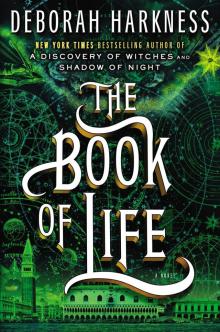 The Book of Life
The Book of Life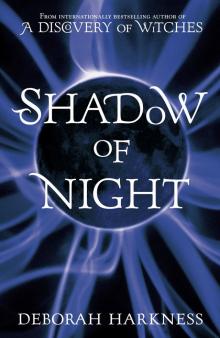 Shadow of Night
Shadow of Night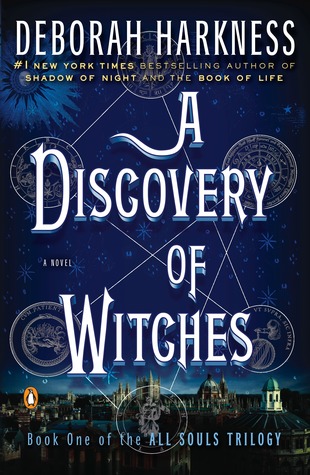 A Discovery of Witches
A Discovery of Witches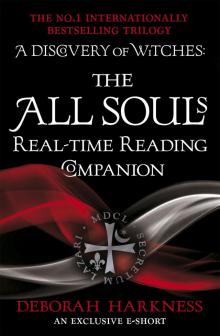 The All Souls Real-Time Reading Companion
The All Souls Real-Time Reading Companion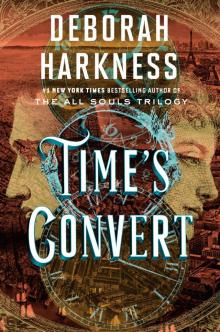 Time's Convert
Time's Convert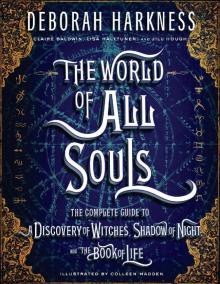 The World of All Souls
The World of All Souls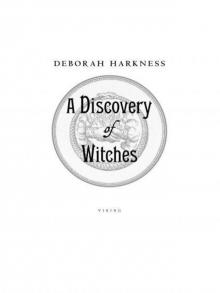 A Discovery of Witches: A Novel (All Souls Trilogy)
A Discovery of Witches: A Novel (All Souls Trilogy)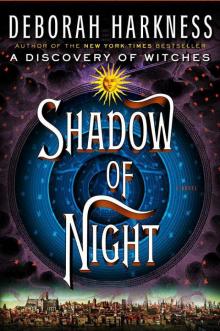 Shadow of Night: A Novel
Shadow of Night: A Novel